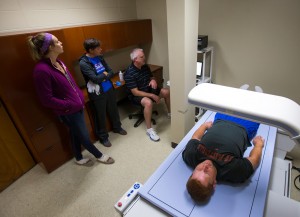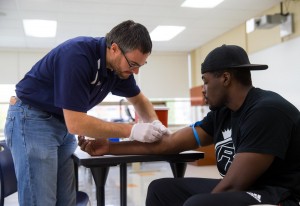PLATTEVILLE, Wis. — UW-Platteville Assistant Professor in the Health and Human Performance Department Dr. Matthew Rogatzki, is conducting research to examine concussions and develop an objective way to test for a concussion using bio-markers.
With the help of previous research conducted by professor Richard Davison from the University of Western Scotland, Rogatzki recently completed data collection with the help of undergraduates in the department for the preliminary phases of this study using student-athletes from the UW-Platteville football team. With the data collected from this initial study, Rogatzki will attempt to receive the National Institute of Health grant to further his research from a National Institute of Neurological Disorders and Stroke. This grant would give him $300,000 disbursed over three years.
This study is focusing on two blood bio-markers, Neuronal Specific Enolase and Protein S 100-B, which, through previous research, have been shown to increase in the blood when an athlete has experienced a head injury.
“We’re looking at these markers to see if they actually increase before a football game versus after the football game and determining, using video analysis, who had the most hits to see if those bio-markers increase the most in those people,” said Rogatzki. “Hopefully, we can use these bio-markers to predict when a concussion is going to occur, so we can establish a threshold. When the bio-markers are over this threshold, it’s likely that a concussion occurred and as we near that threshold, we know that our athlete is at risk for a concussion. Once a concussion has happened, we can monitor those blood bio-markers when they come back to a normal level, and we can say if this athlete is okay to go back into play.”
Rogatzki expressed that he has many goals for this study regarding this preliminary round of research as well as looking in the future with the support of the NIH grant.

(from left to right): Abigail Fischer (biology major), Ryanne Breckenridge (certified athletic trainer), and Scott Soja (assistant professor in the department of health and human performance) performs a DXA scan on a UW-Platteville football player.
“My ultimate goal is to show that the bio-markers will increase dependent upon the magnitude of impact, and if we get the NIH grant, we’ll also be looking into angular and linear acceleration of the head, so we’ll be able to see this increase acceleration of the head, which would show an increase of these bio-markers,” he said. “The complete end-goal would be to find that these bio-markers do indeed indicate when an athlete is at risk for a concussion and when the athlete has a concussion and again monitor when they can return to play. [We then can] make that technology available so that it’s simple enough that a trainer on the field can do a simple finger prick and measure these bio-markers. Right now, they use a lot of functional tests to determine if someone had a concussion. This test can be cheated by the athletes. Sometimes they’ll lie so that they can get back into the game, but this will be a completely objective test. You can’t lie about the bio-markers in your blood. [All of this] will prevent the occurrence of second-impact syndrome.
Daniel Halterman, a junior elementary education major and punter for the football team of Stanley, Wis., agreed to be a participant for this study and described how he has been personally affected by concussions.
“I feel that [this research] is important because it is crucial to know how bad the concussion is and when that player can return back to play,” Halterman said. “I’ve only had one diagnosed concussion in my life, which was four years ago. I know for a fact that I have had countless non-diagnosed concussions in my life from playing football. I never wanted to miss a snap, so I never said anything. If Dr. Rogatzki can find what he is looking for this could be a huge step in diagnosing concussions and could save lives.”
Dr. Jeff White, who has served as the primary care doctor during this research, also expressed how important this research is to saving lives.
“Having a quantifiable system for evaluating and managing concussions both on and off the field would save lives and would help doctors and trainers to potentially prevent a lifetime of disability for the athlete,” White stated.
Certified athletic trainer for the university, Ryanne Breckenridge, is also involved with this study and is excited to see where the results go.
“I, personally, hope to gain insight into ways to help athletes in the future and to possibly provide additional ways to objectively measure concussion and concussion symptoms leading to better ways to diagnose and treat them,” said Breckenridge “This level of monitoring is several years away, but it is exciting to think that this could be a possibility in the future depending on what the data shows.”
As of now, Rogatzki and his research team are only working with the football team because they have the greatest risk for this kind of injury. However, he expressed that he would like to further this study to soccer as well as working with swimmers as a control group.
Written by: Emalydia Flenory, UW-Platteville University Information and Communications, 608-342-1194, flenorye@uwplatt.edu

